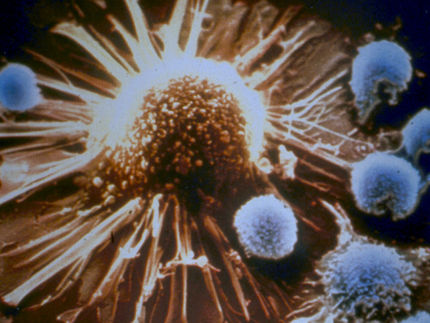New approach for targeted cancer immunotherapy
Novel immunotherapy, based on a locally focused activation of immune cells, could help to more efficiently eradicate tumor cells and reduce side effects
cancer immunotherapies make use of the ability of the immune system to attack cancer cells: they unleash the killer function of T cells, which then attack and eradicate the cancer cells. However, tumors have their own mechanisms to paralyze these attacks. Despite major advances in immunotherapies, there are a large number of cancer patients whose tumors have proved resistant. Immunotherapies can also lead to severe side effects.

Targeted immunotherapy could fight tumors efficiently while sparing healthy tissue (Symbolic image).
stux, pixabay.com
Researchers led by Professor Alfred Zippelius at the University of Basel and University Hospital Basel have investigated the immune responses induced by a new approach: a cancer immunotherapy that attacks the tumor in a targeted and efficient manner. The study was carried out in collaboration with the Roche Innovation Center Zurich and the Cantonal Hospital Baselland, and was recently reported in the Journal for ImmunoTherapy of Cancer.
Locally focused effect
The approach is based on a molecule that stimulates T cells – but only if they are in the immediate vicinity of the tumor. The targeted effect is based on the fact that the active substance only binds to and activates T cells when it is bound to a specific protein expressed in the tumor environment. “By binding to T cells, the active substance enhances their killer function,” says Dr. Marta Trüb, a postdoc in Zippelius’ research group and one of the lead authors of the study.
The ‘switch’ on the T cells activated by the drug is called 4-1BB. This T cell receptor had already been identified as a promising target for immunotherapy. However, previous therapeutic approaches failed due to severe side effects. “With this novel approach, the effect is focused on the tumor and spares the rest of the body,” explains Trüb.
The researchers achieved promising results in experiments with tumors isolated from lung and ovarian cancer patients: the T cells stimulated with the new approach showed increased proliferation and released messenger substances that supported the attack on the cancer cells. Based on their results, the researchers hope that this new approach will proceed to clinical trials in the future.
Original publication
Other news from the department science

Get the life science industry in your inbox
By submitting this form you agree that LUMITOS AG will send you the newsletter(s) selected above by email. Your data will not be passed on to third parties. Your data will be stored and processed in accordance with our data protection regulations. LUMITOS may contact you by email for the purpose of advertising or market and opinion surveys. You can revoke your consent at any time without giving reasons to LUMITOS AG, Ernst-Augustin-Str. 2, 12489 Berlin, Germany or by e-mail at revoke@lumitos.com with effect for the future. In addition, each email contains a link to unsubscribe from the corresponding newsletter.





















































